|
|
|
Sort Order |
|
|
|
Items / Page
|
|
|
|
|
|
|
| Srl | Item |
| 1 |
ID:
146180


|
|
|
|
|
| Summary/Abstract |
Why do internal wars start anew after they apparently end? I argue that rebel arrangements made for strategic reasons during wars sometimes create provocative effects even after conflicts end; coalitions formed between opposing groups during conflicts often precipitate disruptive commitment problems at the end of wars. This competition can abet the conflict renewal process, especially after wars terminating in military outcomes. Using new data on competitive militant alliances in civil wars, this study probes how rebel rivalries impact peace duration after wars. The evidence indicates that rivalry within coalitions shortens the period of postconflict peace. Wars ending in military victories give way, as many scholars argue, to lengthier periods of peace. But this effect reverses in the context of conflicts characterized by competitive alliances. Indeed, the combination of competitive alliances and a military victory strongly precipitates a resumption of hostilities. This perpetuation of the “conflict trap” proves especially pronounced when rebels win wars. My study implies that peacekeeping or third party forces may find the least local consent for their presence precisely where they matter most in post-conflict environments. As former work has shown, victorious rebels, having wrested power by force from vanquished governments, have relatively little desire for outside interference.
|
|
|
|
|
|
|
|
|
|
|
|
|
|
|
|
| 2 |
ID:
146187
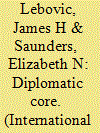

|
|
|
|
|
| Summary/Abstract |
Face-to-face diplomacy is an important feature of international relations. But when and why do high-level diplomatic interactions occur? We examine different theoretical perspectives using a new dataset of diplomatic visits by the US President and Secretary of State. We argue for assessing these visits along two dimensions. First, we posit that the degree of discretion or constraint in the diplomatic calendar falls along a spectrum. Strategic and domestic factors are at opposite extremes while diplomatic routines fall in the middle. Second, we consider the convergence in the relative influence of these sets of factors across the President’s and the Secretary’s calendars. We develop and test hypotheses about the determinants of visits by the President and Secretary of State across twelve presidencies from 1946 to 2010. Overall, the travels of the President and Secretary converge to serve a set of priorities that derive from a fairly stable set of national interests and from diplomatic routine. We observe that the President effectively retraces the footsteps of the Secretary more than the reverse. We find some evidence of domestic (including individual-level) influences on diplomacy, but only limited evidence that times of crisis produce distinct patterns in face-to-face encounters.
|
|
|
|
|
|
|
|
|
|
|
|
|
|
|
|
| 3 |
ID:
146186
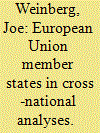

|
|
|
|
|
| Summary/Abstract |
Many empirical models make assumptions about the primacy of domestic politics that fail to accommodate new trends in supranational policy making. Scholars now acknowledge that national political decisions often depend on other countries, international institutions, or global economic conditions. More interestingly, many sovereign countries have either lost or purposely delegated away policy autonomy to supranational institutions. For example, fixed exchange rates, regional trade agreements, and transnational regulations create the distinct possibility that domestic politics no longer provide a sufficient explanation for many policy outcomes. In some respects, two types of countries now exist: those that retain decision-making authority over a given policy space and those that do not. Combining both types of countries into a larger cross-national sample may generate flawed substantive results and fails to adequately test hypotheses. I use the example of European Union (EU) governance over trade policy to demonstrate the empirical dangers of disregarding differences in policy autonomy among countries.
|
|
|
|
|
|
|
|
|
|
|
|
|
|
|
|
| 4 |
ID:
146178
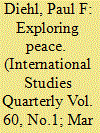

|
|
|
|
|
| Summary/Abstract |
Concern about war and large-scale violence has long dominated the study of international security. To the extent that peace receives any scholarly attention, it primarily does so under the rubric of “negative peace:” the absence of war. This article calls for a focus on peace in international studies that begins with a reconceptualization of the term. I examine the limitations of negative peace as a concept, discuss “positive peace,” and demonstrate empirically that Nobel Peace Prize winners have increasingly been those recognized for contributions to positive peace. Nevertheless, scholarly emphasis remains on war, violence, and negative peace—as demonstrated by references to articles appearing in a leading peace-studies journal and to papers presented at International Studies Association meetings. Peace is not the inverse or mirror image of war and therefore requires different theoretical orientations and explanatory variables. The article concludes with a series of guidelines on how to study peace.
|
|
|
|
|
|
|
|
|
|
|
|
|
|
|
|
| 5 |
ID:
146190


|
|
|
|
|
| Summary/Abstract |
Recent international relations scholarship tends to view sexual violence, especially rape, as an exceptional—if not aberrant—phenomenon in war and armed conflict. Indeed, it often treats it as the sole form of gender-based violence capable of threatening international peace and security. I challenge the isolation of this particular form of gender violence in the study and governance of international security. I argue that the securitization of sexual violence produced its “fetishization” in international advocacy, policy, and scholarship. The stages of securitization operate as a process of fetishization by first, decontextualizing and homogenizing this violence; second, objectifying this violence; and third, affecting inter-unit relations through the “selling back” of sexual violence to actors involved in conflict. As such, my argument helps specify why securitization fails to adequately address an issue like sexual violence and often results in further retrenchment of disparate power relations.
|
|
|
|
|
|
|
|
|
|
|
|
|
|
|
|
| 6 |
ID:
146189
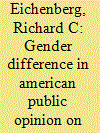

|
|
|
|
|
| Summary/Abstract |
Recent scholarship indicates that gender correlates strongly with Americans' attitudes toward the use of military force. However, most of its evidence derives from the study of major wars, and the field needs more historical research to evaluate the evolution of gender difference over time. I redress these limitations by updating and extending my earlier (2003) analysis of public support for the use of force during the 1990s. I analyze 965 individual survey questions concerning the use of US military force in twenty-four historical episodes, beginning in 1982 with military aid to El Salvador and continuing through the recent wars in Afghanistan, Iraq, Libya, and Syria. I find that substantial gender difference characterizes a large number of historical episodes and types of military action. Nonetheless, the magnitude of gender difference varies substantially; in many cases, a substantial percentage of women supports the use of force. The difference between men and women varies most with the salience and level of violence, and women are more sensitive to humanitarian concerns. Women display more sensitivity to casualties in some historical cases, but during the wars in Iraq and Afghanistan, the casualty sensitivity of men gradually increased as the wars dragged on, and gender differences therefore decreased. Thus, I argue that scholars should turn their attention to studying individual-level differences between and among men and women in support for using military force. I also discuss the political and policy implications of the findings.
|
|
|
|
|
|
|
|
|
|
|
|
|
|
|
|
| 7 |
ID:
146192


|
|
|
|
|
| Summary/Abstract |
Over the last three decades, thousands of prosecutions for human rights abuses have progressed through domestic courts, a puzzling fact considering that state leaders have little incentive to punish their own agents. Previous studies have advanced rational-choice or sociological-institutionalist accounts of this phenomenon, emphasizing the role of political coalitions or regional cultures. Few, though, have recognized the local, private struggles that lie at the root of the trend toward domestic human rights enforcement. In this article, we develop a historical-institutionalist theory of normative change centered on the notion of “prosecutorial momentum.” We contend that the rise in domestic trials against rights-abusing state agents in Europe and Latin America results in large part from the cumulative efforts of victims and human rights lawyers utilizing their rights to private criminal prosecution. Using a new data set and mixed methods, we offer a systematic analysis of how rights to private criminal prosecution, when activated in response to a legacy of repression, helps set in motion sustained efforts to pursue domestic enforcement and compliance with international law.
|
|
|
|
|
|
|
|
|
|
|
|
|
|
|
|
| 8 |
ID:
146191
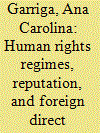

|
|
|
|
|
| Summary/Abstract |
What are the effects of international human-rights regimes on foreign direct investment (FDI)? Existing scholarship generally suggests a negative relationship between human-rights violations and FDI. Furthermore, research shows that international regimes can have effects on third parties such as non-member countries and other nonstate actors. However, it remains unclear how a country’s participation in human-rights regimes could affect investors’ decisions. I argue that host country participation in human-rights regimes provides a “reputational umbrella” for investors and therefore positively affects FDI. This effect proves stronger in countries with poor human rights records. Interestingly, investors appear not to punish human-rights violations if the state is a party to many human-rights regimes. Empirical analyses on a sample of 135 developing countries, from 1982 to 2011, provide support for the existence of these direct and indirect effects. The findings help to disentangle reputational effects from other possible causal mechanisms. Results are robust to various model specifications, including tests for endogeneity and reverse causality.
|
|
|
|
|
|
|
|
|
|
|
|
|
|
|
|
| 9 |
ID:
146182
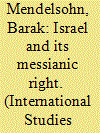

|
|
|
|
|
| Summary/Abstract |
Why do states responsible for unleashing violent nonstate actors fail to halt them despite rising costs and, at best, marginal utility? I argue that a historical-institutionalist approach helps scholars understand these dynamics. I present five path-dependent mechanisms—change in the balance of power, spiraling perception of threat, ideological shift among the public, state penetration, and weakening of the principle of state primacy—that diminish the prospects of policy reversals. I then demonstrate the usefulness of path-dependency analysis in the case of Israel’s entanglement with the Jewish messianic Right. Applying the theoretical framework sheds light on the process that brought Israel prohibitive costs—undercutting the Israeli-Palestinian peace process, undermining the state’s international standing, and weakening the state’s authority and democratic nature—and made policy reversal, in line with the state’s national interest and its responsibilities as a member of the international society, highly unlikely.
|
|
|
|
|
|
|
|
|
|
|
|
|
|
|
|
| 10 |
ID:
146184


|
|
|
|
|
| Summary/Abstract |
What makes certain dictatorships more likely than others to democratize? I argue that military dictators, as specialists in violence, often remain threats to their successors. However, when democratic systems replace military dictatorships, that expertise presents less danger to new incumbents. Because democracies select leaders through elections, they reduce the importance of military expertise—and the role of associated violence—in contests for office. Thus, military dictatorships should prove more likely to transition quickly to democracy; military dictators will expect a lower likelihood of punishment—including death—at the hands of their successors than if they are replaced by other dictators. Therefore, incumbent military dictators see democratic systems as less dangerous to them; they face specific incentives to ensure a quick and effective transition to democracy. I provide support for my theory with evidence from the post-World War II period.
|
|
|
|
|
|
|
|
|
|
|
|
|
|
|
|
| 11 |
ID:
146181


|
|
|
|
|
| Summary/Abstract |
Why do some parties to intrastate conflict refuse to negotiate? I propose a simple theory of civil conflict in which the act of negotiation itself carries costs and benefits. Several hypotheses follow: parties to civil conflict will avoid negotiation when they (1) fear alienating external supporters or internal constituencies, (2) risk granting legitimacy to their opponents or signaling weakness to other potential claimants, or (3) find it difficult to identify reliable negotiating partners. Empirical tests find support for my argument. My findings suggest that cases exist in which the parties would reach an agreement if only they could overcome the costs of negotiation and engage in talks. Diplomats and mediators should consider the costs and benefits of talks when planning the timing and form of interventions designed to bring parties to the table.
|
|
|
|
|
|
|
|
|
|
|
|
|
|
|
|
| 12 |
ID:
146185
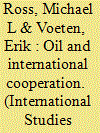

|
|
|
|
|
| Summary/Abstract |
The more that states depend on oil exports, the less cooperative they become: they grow less likely to join intergovernmental organizations, to accept the compulsory jurisdiction of international judicial bodies, and to agree to binding arbitration for investment disputes. This pattern is robust to the use of country and year fixed effects, to alternative measures of the key variables, and to the exclusion of all countries in the Middle East. To explain this pattern, we consider the economic incentives that foster participation in international institutions: the desire to attract foreign investment and to gain access to foreign markets. Oil-exporting states, we argue, find it relatively easy to achieve these aims without making costly commitments to international institutions. In other words, natural resource wealth liberates states from the economic pressures that would otherwise drive them toward cooperation.
|
|
|
|
|
|
|
|
|
|
|
|
|
|
|
|
| 13 |
ID:
146179


|
|
|
|
|
| Summary/Abstract |
This article outlines two theoretical and methodological approaches that take a queer intellectual curiosity about figurations of “homosexuality” and “the homosexual” as their core. These offer ways to conduct international relations (IR) research on “the homosexual” and on international relations figurations more broadly, for example, from “the woman” to “the human rights holder.” The first approach provides a method for analyzing figurations of “the homosexual” and sexualized orders of IR that are inscribed in IR as either normal or perverse. The second approach offers instructions on how to read plural figures and plural logics that signify as normal and/or perverse (and which might be described as queer). Together, they propose techniques, devices, and research questions to investigate singular and plural IR figurations—including but not exclusively those of “the homosexual”—that map international phenomena as diverse as colonialism, human rights, and the formation of states and international communities in ways that exceed IR survey research techniques that, for example, incorporate “the homosexual” into IR research through a “sexuality variable.”
|
|
|
|
|
|
|
|
|
|
|
|
|
|
|
|
| 14 |
ID:
146183


|
|
|
|
|
| Summary/Abstract |
In Thailand, India, Libya, and elsewhere, governments arm the populace or call up volunteers in irregular armed groups despite the risks this entails. The widespread presence of these militias, outside the context of state failure, challenges the expectation that governments uniformly consolidate the tools of violence. Drawing on the logic of delegation, we resolve this puzzle by arguing that governments have multiple incentives to form armed groups with a recognized link to the state but outside of the regular security forces. Such groups offset coup risks as substitutes for unreliable regular forces. Similar to other public-private collaborations, they also complement the work of regular forces in providing efficiency and information gains. Finally, these groups distance the government from the controversial use of force. These traits suggest that militias are not simply a sign of failed states or a precursor to a national military, but an important component of security portfolios in many contexts. Using cross-national data (1981–2005), we find support for this mix of incentives. From the perspective of delegation, used to analyze organizational design, global accountability, and policy choices, the domestic and international incentives for governments to choose militias raise explicit governance and accountability issues for the international community.
|
|
|
|
|
|
|
|
|
|
|
|
|
|
|
|
| 15 |
ID:
146188


|
|
|
|
|
| Summary/Abstract |
Previous research shows that, when it comes to foreign policy, individuals have general orientations that inform their beliefs toward more specific issues in international relations. But such studies evade an even more important question: what gives rise to such foreign-policy orientations in the first place? Combining an original survey on a nationally representative sample of Americans with Schwartz's theory of values from political psychology, we show that people take foreign policy personally: the same basic values that people use to guide choices in their daily lives also travel to the domain of foreign affairs. Conservation values are most strongly linked to “militant internationalism,” a general hawkishness in international relations. The value of universalism is the most important value for predicting “cooperative internationalism,” the foreign-policy orientation marked by a preference for multilateralism and cosmopolitanism in international affairs. This relatively parsimonious and elegant system of values and foreign-policy beliefs is consistent across both high- and low-knowledge respondents, offering one potential explanation for why those people who are otherwise uninformed about world politics nonetheless express coherent foreign-policy beliefs.
|
|
|
|
|
|
|
|
|
|
|
|
|
|
|
|
|
|
|
|
|